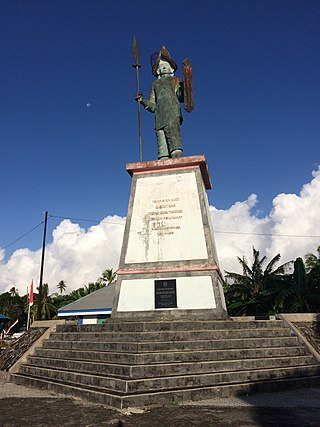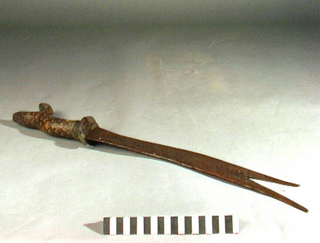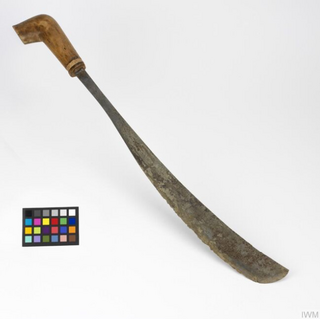
Nagasari is a traditional Indonesia steamed cake, originating from Javanese cuisine, made of rice flour, coconut milk and sugar, filled with a slice of banana and wrapped in banana leaves.

Sukabumi Regency is a regency (kabupaten) in southwestern Java, as part of West Java province of Indonesia. The regency seat is located in Palabuhan Ratu, a coastal district facing the Indian Ocean. The regency fully encircles the administratively separated city of Sukabumi. Covering an area of 4,164.15 km2, the regency is the largest regency in West Java and the second largest regency on Java after the Banyuwangi Regency in East Java. The regency had a population of 2,341,409 at the 2010 census and 2,725,450 at the 2020 census; the official estimate as at mid 2023 was 2,802,404, with a large proportion of it living in the northeastern part of the regency that encircles Sukabumi City, south of Mount Gede. A plan to create a new regency, the putative North Sukabumi Regency, is currently waiting for the approval of the central government, which has been deferred until the end of the current morotorium on new creations of regencies.
The Batin are a sub-group of Malay people that inhabits the interior parts of Jambi province

Satu Suro is the first day of the Javanese calendar year in the month of Suro, corresponding with the first Islamic month of Muharram. It is mainly celebrated in Java, Indonesia, and by Javanese people living elsewhere.
Limboto is a town in Indonesia and the administrative centre of Gorontalo Regency.

Gorontalo people, also known as Gorontalese are a native ethnic group and the most populous ethnicity in the northern part of Sulawesi. The Gorontalo people have traditionally been concentrated in the provinces of Gorontalo, North Sulawesi, and the northern part of Central Sulawesi.
Mangkeng is a ceremony used by the Betawi people, who traditionally live in the coastal villages of Jakarta. The ceremony is used at important public gatherings and especially at weddings. The main purpose is to bring good luck and ward off the rain. It is performed by the village shaman, also called the Pangkeng shaman, where the name originates.

The Kanta is a traditional shield of the Toraja and Pamona people of Tana Toraja Regency, South Sulawesi and Poso Regency, Central Sulawesi, Indonesia respectively.

The Lampung or Lampungese are an indigenous ethnic group native to Lampung and some parts of South Sumatra, Bengkulu, as well as in the southwest coast of Banten. They speak the Lampung language, a Lampungic language estimated to have 1.5 million speakers.

The Muna or Wuna are an indigenous group that inhabits Muna Island, Southeast Sulawesi, Indonesia. From the physical appearance of the body, skull, skin color, and hair it appears that the aboriginal Muna people are closer to the ethnic groups of Polynesians and Melanesians in the Pacific and Aboriginal Australians compared to the Buginese or Malays. This is evident by the similarities of the people and their culture with of those in the East Nusa Tenggara, and the islands of Timor and Flores generally. Woven sarong motifs found in East Nusa Tenggara and Muna Island share similar features such as horizontal lines with basic colors of yellow, green, red, and black. The shape of their headwear also has a resemblance to each other. Since before until today, Muna fishermen often harvest sea cucumbers and go fishing up to the waters of Darwin, Australia in the Timor Sea. This has caused Muna fishermen to have been arrested several times in these waters by the Australian government. These habits may probably indicate the existence of a traditional relationship between the Muna people with Aboriginal Australians.

Soerabaia 45 is an Indonesian film released in 1990. The film was directed by Imam Tantowi and starred Nyoman Swadayani, Leo Kristi, and Usman Effendy. The story of the film is based on the 1945 Battle of Surabaya between pro-independence Indonesian soldiers and militia against British and British Indian troops as a part of the Indonesian National Revolution.

The Legiun Pakualaman was an army corps of the Pakualaman princely state of Yogyakarta, formed in 1813 during the reign of Paku Alam I. The force was initially formed not only as a symbol of pride for the newly formed state, but also as a reserve force for the British, and later also the Dutch, colonial governments.

Islam in Central Sulawesi, a province of Indonesia, is the majority religion embraced by around 75% of the province's 2,683,722 inhabitants . The propagators of Islam were thought to enter Central Sulawesi through neighboring regions, namely Bone, Wajo, and Mandar from the south and west routes, and through Gorontalo and Ternate from the north and east routes via Tomini Bay and Tolo Bay.
A Pujungan Inscription, also called Bronze Tongtong Inscription, is a short inscription written on a copper slit drum, which was found in the village of Pujungan in Pupuan District, Tabanan Regency, Bali, Indonesia. This inscription is thought to have been written during the reign of King Anak Wungsu in the 11th century. This is the first inscription that mentions the name Sasak, the name of the indigenous people of Lombok island.

Dra. Augustine Magdalena Waworuntu, was an Indonesian politician who became the first post-federal Indonesian mayor of Manado and the first female mayor of Manado.
The Dayak Desa War or Majang Desa War was an armed uprising by the Dayak Desa tribe, and later Indonesian nationalists, in West Kalimantan against the Japanese Empire and the Dutch East Indies during World War II. The war was initially caused by the local population's opposition against the rōmusha system and disappointment with Japanese occupation. In the initial phase of Japanese occupation, several Japanese companies entered the region to gain natural resources in order to support the Japanese war effort in the Pacific. Occupying Japanese forced locals to work for free for these companies, mainly in coal mining and timber production. After that, a Japanese foreman working in a company wanted to marry the daughter of Pang Linggan, a respected Dayak chief in the region, which caused more tension between locals and the Japanese. Dayak tribes in the region initiated mangkuk merah ritual, as a sign to mobilise men from villages and prepare for war. The Japanese were driven out of the Borneo interior in June 1945, but returned on 17 July and continued until 31 August 1945 when Japanese forces there surrendered and left the region, replaced by Allied forces including the Dutch, who would later be opposed again until recognition of Indonesian independence in 1949.

Don Jugov Santiago, popularly known as Bataha Santiago, was the third king of Manganitu Kingdom in Sangihe Islands of modern-day Indonesia. He ruled from 1670 until his death in 1675 and is known for his opposition to opening relations with the Dutch, which resulted in his deposition and execution. He was awarded title National Hero of Indonesia in 2023.

Hemola or Hemala is a traditional sword of the Savu people from Indonesia. It is also called Tafa by the neighboring Rotenese people.

The Bara Sangihe sword originates from North Sulawesi, Indonesia.

The Tangkin is a traditional parang (knife) of the Iban people from Sarawak, Malaysia and West Kalimantan, Indonesia.


















